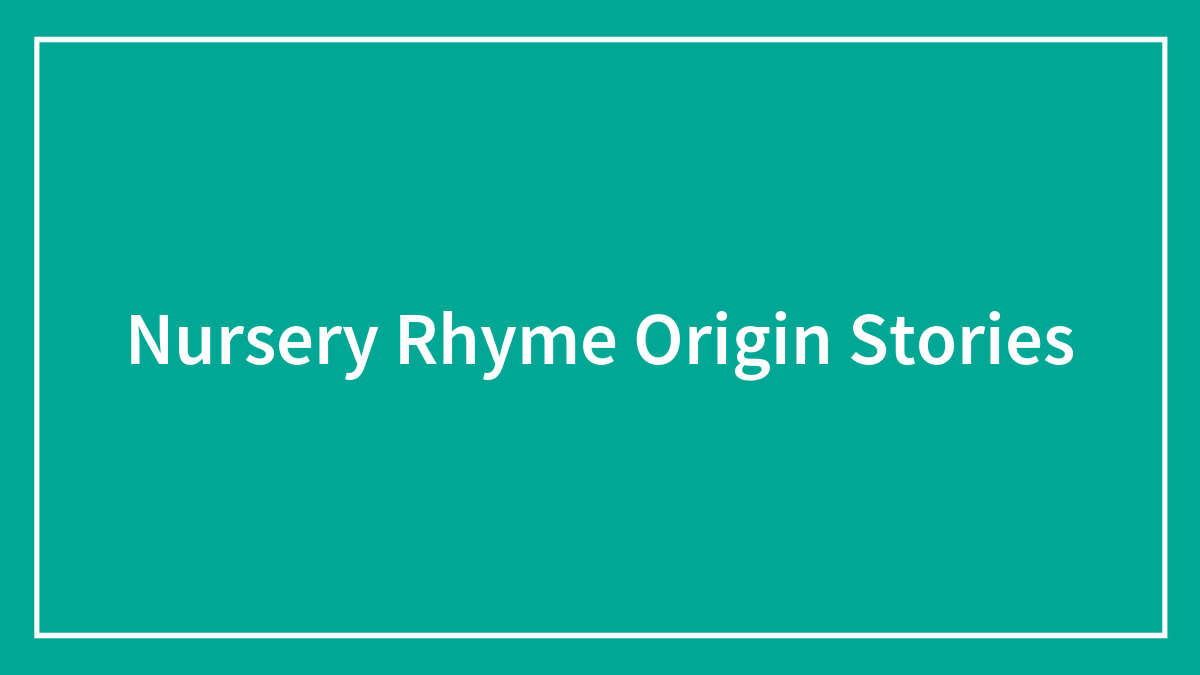Chances are that when you were a kid, your parents sang you nursery rhymes to get you to sleep. And if that was the case, it is very likely they sang old nursery rhymes that were passed on from generation to generation like some family relic. A relic whose origins are unknown, meaning undiscovered, and powers unchanged. However, there comes a time when every mystery is solved, so if you came here to figure out nursery rhyme origin stories, you’ll absolutely find just that in this list.
But, before you begin gleaning the information on origin stories of nursery rhymes, be warned that most of them are much more sinister than you would’ve cared to think. Nursery rhymes often served the purpose of cautionary tales, although who thought that slipping the idea of chopped-off fingers to kids would help them fall asleep is beyond us. It’s probably because life, in general, used to be much more brutal than in our time, and these nursery rhymes for kids seemed appropriate, well, for kids. However, we do warn you again - chopped-off fingers are just a cherry on top, and revisiting these children’s rhymes in your adult years might make you all goose-bumpy with their cruelty and brutishness.
Okay, now that we’ve shared our warnings not once but twice, and since you’re still here, you can now proceed to the children’s nursery rhymes and the stories behind them. Once you are done with these shocking tales, be sure to upvote the old nursery rhymes whose origin stories were the most unexpected to you; we’re very curious to see which one of them will be the winner!
This post may include affiliate links.
"Baa Baa Black Sheep" This poem is allegedly about the medieval wool tax imposed by King Edward I, under which he earned one-third of the proceeds of every sack. Having three sacks of wool meant that one was for the king, so to speak. Additionally, since black sheep wool couldn't be coloured, it sold for less money, making it less profitable. "Baa, baa, black sheep, Have you any wool? Yes, sir, yes, sir, Three bags full; One for my master, One for my dame, And one for the little boy Who lives down the lane."
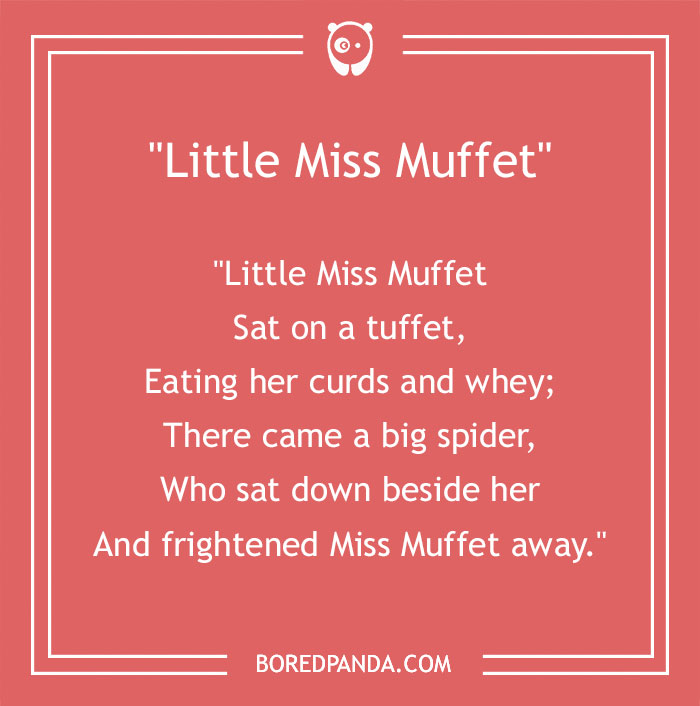 "Little Miss Muffet"
Patience Muffet, often known as Little Miss Muffet, was a little child. Her dad, Dr. Muffet, was a well-known entomologist who published the first academic list of British insects between 1553 and 1604. Little Miss Muffet was eating curds and whey for breakfast when she was startled by one of his spiders and fled. According to Dr. Muffet's birthdate, this specific Little Miss Muffet nursery rhyme is believed to have been written in the late 16th century.
"Little Miss Muffet
Sat on a tuffet,
Eating her curds and whey;
There came a big spider,
Who sat down beside her
And frightened Miss Muffet away."
"Little Miss Muffet"
Patience Muffet, often known as Little Miss Muffet, was a little child. Her dad, Dr. Muffet, was a well-known entomologist who published the first academic list of British insects between 1553 and 1604. Little Miss Muffet was eating curds and whey for breakfast when she was startled by one of his spiders and fled. According to Dr. Muffet's birthdate, this specific Little Miss Muffet nursery rhyme is believed to have been written in the late 16th century.
"Little Miss Muffet
Sat on a tuffet,
Eating her curds and whey;
There came a big spider,
Who sat down beside her
And frightened Miss Muffet away."
"Three Blind Mice" Three Blind Mice was first recorded in writing in 1609. Three Protestant allies known as "the three blind mice" were charged with conspiring to overthrow Queen Mary I. The queen who shared extensive estates with her husband, King Philip of Spain, is referred to as the "farmer's wife." The three guys were burned at the stake. "Three blind mice. Three blind mice. See how they run. See how they run. They all ran after the farmer's wife, Who cut off their tails with a carving knife, Did you ever see such a sight in your life, As three blind mice?"
"One for Sorrow" The poem is based on ornithomancy myths about magpies, which were thought to be a sign of bad luck in various cultures and in Britain at least as early as the seventeenth century. The poem was originally mentioned in a remark in John Brand's Observations on Popular Antiquities of Lincolnshire, which was published about 1780. "One for sorrow, Two for joy, Three for a girl, Four for a boy, Five for silver, Six for gold, Seven for a secret never to be told."
My dad used to sing this all the time when we were kids, intentionally really out of tune and it would really crack us up. I recently got a memorial tattoo for my dad that's a magpie with the words "one for sorrow"
"Rub a Dub Dub" This poem originally dealt with sexual amusement. "Three maids" were in a tub in the story. The limerick was about a peep show where guests may see ladies wash, a common feature at traveling fairs. The baker, the candlestick maker, and the butcher were among the onlookers. Later, the Victorians modified the terms to place the three men in the tub and referred to themselves as cleaning it up. "Rub-a-dub-dub, Three men in a tub, And who do you think they be? The butcher, the baker, the candlestick maker, And all of them out to sea."
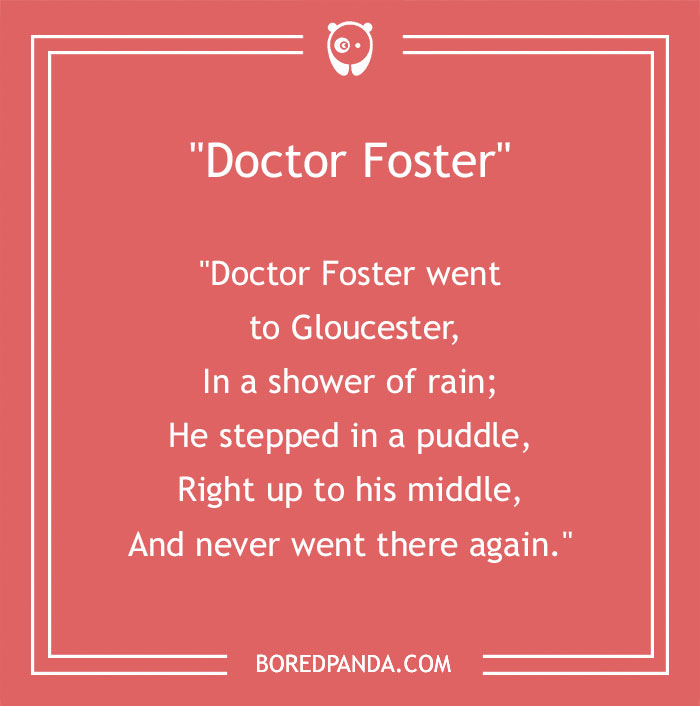 "Doctor Foster"
The origins of this rhyme may go back more than 700 years, to the reign of King Edward I, despite being first printed in 1844. Edward was a powerful guy, stood over six feet tall. He was frequently called Longshanks. Edward was also regarded as a smart and knowledgeable man, earning the moniker Dr. Foster; the name's origins are lost to time. Edward, who was not a big friend of the Welsh, was probably at Gloucester because of its advantageous location at a significant River Seven crossing into Wales.
According to legend, the king rode his horse in the wrong direction after mistaking a a huge ditch for a minor puddle when he arrived during a storm. Infuriated and perhaps humiliated by the ordeal, he vowed never to return to the town when his horse and rider became stuck in the muck and had to be dragged out.
"Doctor Foster went to Gloucester,
In a shower of rain;
He stepped in a puddle,
Right up to his middle,
And never went there again."
"Doctor Foster"
The origins of this rhyme may go back more than 700 years, to the reign of King Edward I, despite being first printed in 1844. Edward was a powerful guy, stood over six feet tall. He was frequently called Longshanks. Edward was also regarded as a smart and knowledgeable man, earning the moniker Dr. Foster; the name's origins are lost to time. Edward, who was not a big friend of the Welsh, was probably at Gloucester because of its advantageous location at a significant River Seven crossing into Wales.
According to legend, the king rode his horse in the wrong direction after mistaking a a huge ditch for a minor puddle when he arrived during a storm. Infuriated and perhaps humiliated by the ordeal, he vowed never to return to the town when his horse and rider became stuck in the muck and had to be dragged out.
"Doctor Foster went to Gloucester,
In a shower of rain;
He stepped in a puddle,
Right up to his middle,
And never went there again."
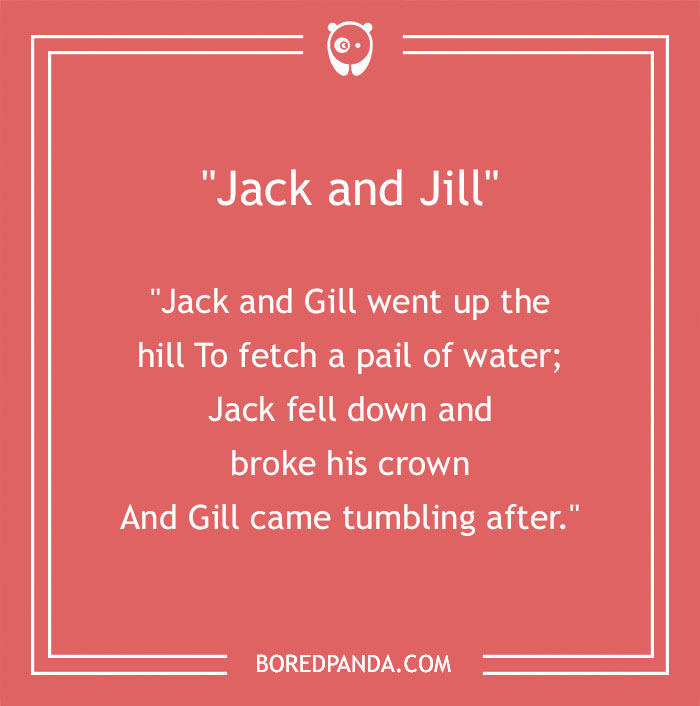 "Jack and Jill"
This well-known rhyme, originally titled "Jack and Gill," describes King Charles I's attempt to enact a reform of liquid taxes. Jacks and gills were apparently used as units of measurement. Charles lowered the volume of these measures after Parliament rejected the tax.
"Jack and Gill went up the hill
To fetch a pail of water;
Jack fell down and broke his crown
And Gill came tumbling after."
"Jack and Jill"
This well-known rhyme, originally titled "Jack and Gill," describes King Charles I's attempt to enact a reform of liquid taxes. Jacks and gills were apparently used as units of measurement. Charles lowered the volume of these measures after Parliament rejected the tax.
"Jack and Gill went up the hill
To fetch a pail of water;
Jack fell down and broke his crown
And Gill came tumbling after."
Gills are still used as a measurement of whiskey, for example. They are parts of fish. I am neither, so my name is Jill.
"Row, Row, Row Your Boat" The song's first publication dates back to 1852, when it was released with words that are close to those used today but a radically different music. Two years later, it was issued once more with new music and the same words. The Franklin Square Song Collection initially included the words and the contemporary music in 1881, naming Eliphalet Oram Lyte but leaving it unclear as to whether or not he was the composer or adaptor. "Row, row, row your boat Gently down the stream Merrily merrily, merrily, merrily Life is but a dream."
 "Roses are Red"
A children's rhyme and love poem, it has produced several hilarious and parodic variations and has come to be associated with Valentine's Day.
The rhyme is based on literary devices that may be found in Edmund Spenser's epic poem The Faerie Queene from 1590.
"Roses are red
Violets are blue,
Sugar is sweet
And so are you."
"Roses are Red"
A children's rhyme and love poem, it has produced several hilarious and parodic variations and has come to be associated with Valentine's Day.
The rhyme is based on literary devices that may be found in Edmund Spenser's epic poem The Faerie Queene from 1590.
"Roses are red
Violets are blue,
Sugar is sweet
And so are you."
"Akai Kutsu" The widely accepted idea holds that the lyrics were inspired by a real-life event. Iwasaki Kimi, a young woman from Fushimi in Shizuoka Prefecture, is thought to have served as the inspiration for the image of the woman wearing red shoes. In the beginning, Kimi's mother, Kayo Iwasaki, raised her alone until relocating to Hokkaido and marrying Shirou Suzuki. When Kimi was 3 years old, her parents moved to a Hokkaido commoner's farm, which at the time was being closely scrutinized as a component of the Socialist movement. However, farming was a hard life, so Kayo gave Kimi's upbringing to a married American missionary couple named Hewitt, using her father-in-law Sano Yasuyoshi as a middleman. The Hewitt family eventually made the decision to move back to the United States, but they were unable to bring Kimi with them since she had the then-incurable disease tuberculosis. Instead, they sent her to the church's orphanage in Azabu, Tokyo, and left without her. Kimi passed away at the orphanage at age nine, never getting to see her mother again. Kayo believed during her whole life that Kimi had traveled to America with the Hewitts, but in reality, Kimi had passed away from tuberculosis at a Tokyo orphanage. "A young girl with red shoes was taken away by a foreigner. She rode on a ship from Yokohama pier taken away by a foreigner I imagine right now she has become blue-eyed living in that foreigner’s land. Every time I see red shoes, I think of her And every time I meet a foreigner, I think of her."
Never heard this 1 before either. I'm glad lol they really hate us. And the fox and the hound messed me up enuf as child. But I guess actually it's pretty poignant with what's going on at our southern border. Families ripped apart so I suppose you hold on to any memories. Idk in that backstory it sounds like the Hewitts were just doing what they could while they could do it, right? Or am I completely missing something?
"If Wishes Were Horses, Beggars Would Ride" The lines "If wishes were thrushes beggars would feed birds" from William Camden's "Remains of a Greater Worke, Concerning Britaine," published in 1605, are the rhyme's first recognized predecessor. The phrase "and wishes were horses, pure [poor] folks wald ride" originally appeared in James Carmichael's Proverbs in Scots, published in 1628. "If wishes would bide, beggars would ride" is the first time beggars are mentioned in English proverbs, appearing in John Ray's Collection of English Proverbs in 1670. "If wishes were horses, beggars would ride. If turnips were watches, I'd wear one by my side. If "ifs" and "ands" were pots and pans, There'd be no work for tinkers' hands."
I'd "ifs" and "buts" were candy a day nuts, It would. Be Christmas everyday
 "Jack Sprat"
Jack Sprat could have been King Charles I, who was left "lean" when parliament refused to tax him but was free to "wipe the plate clean" after dissolving parliament with his queen Henrietta Maria, according to history writer Linda Alchin.
"Jack Sprat could eat no fat,
His wife could eat no lean.
And so between them both, you see,
They licked the platter clean."
"Jack Sprat"
Jack Sprat could have been King Charles I, who was left "lean" when parliament refused to tax him but was free to "wipe the plate clean" after dissolving parliament with his queen Henrietta Maria, according to history writer Linda Alchin.
"Jack Sprat could eat no fat,
His wife could eat no lean.
And so between them both, you see,
They licked the platter clean."
"Old McDonald Had a Farm" The first known version of the song is "In the Fields in Frost and Snow," which appears in Thomas d'Urfey's 1706 opera "The Kingdom of the Birds or Wonders of the Sun." It's unclear if this is where the song first appeared or if his interpretation was based on an older folk tune. The animals shift from verse to verse, and the rhythm is quite similar to current renditions, but the melody is in a different minor key. "Old MacDonald had a farm, E-I-E-I-O! And on his farm he had a cow, E-I-E-I-O! With a moo-moo here and a moo-moo there, Here a moo, there a moo, Everywhere a moo-moo, Old MacDonald had a farm, E-I-E-I-O!"
Imagining an opera singer performing Old McDonald is the funniest thing ever.
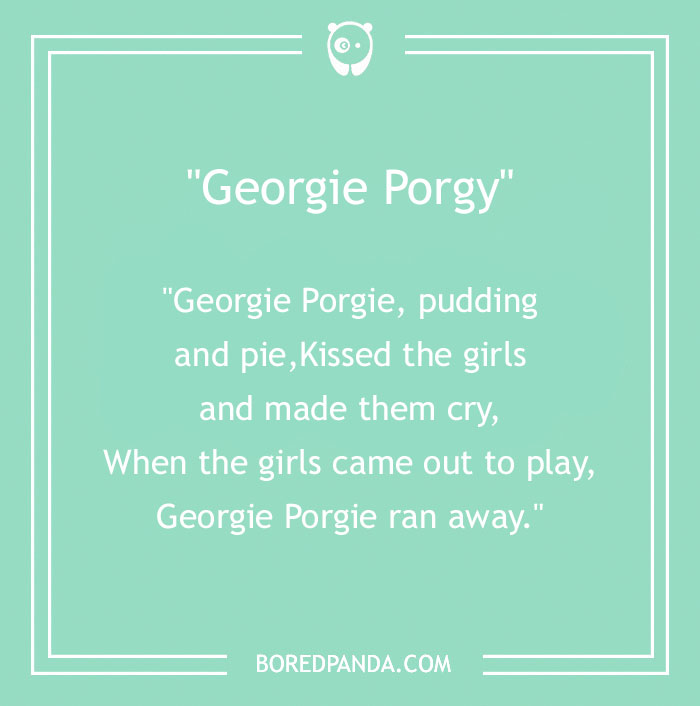 "Georgie Porgy"
It is believed that the "Georgie Porgie" was actually the Prince Regent, afterwards known as George IV. George, who was a little on the tubby side and weighed more than 20 stone with a waist of 50 inches (Georgie Porgie, pudding and pie), was often made fun of in the popular press of the day because of his appearance.
"Georgie Porgie, pudding and pie,
Kissed the girls and made them cry,
When the girls came out to play,
Georgie Porgie ran away."
"Georgie Porgy"
It is believed that the "Georgie Porgie" was actually the Prince Regent, afterwards known as George IV. George, who was a little on the tubby side and weighed more than 20 stone with a waist of 50 inches (Georgie Porgie, pudding and pie), was often made fun of in the popular press of the day because of his appearance.
"Georgie Porgie, pudding and pie,
Kissed the girls and made them cry,
When the girls came out to play,
Georgie Porgie ran away."
I absolultely HATED this rhyme growing up… my first name is Yolande but I was/am known as Yoli…. I was in school very overweight… So all through my primary (elementary) school days, this is what I heard on the playground… “Yoli Poly, Puddin and pie Rolled over the boys and made them die”
"John Jacob Jingleheimer Schmidt" The verses of the nursery rhyme "John Jacob Jingleheimer Schmidt" are American in origin and may be an allusion to the massive influx of German immigrants throughout American history. Both the last name Schmidt and the last name prefix "heimer" have Germanic roots. It is a popular children's rhyme that is sometimes referred to as a "bus song." In order to parody the lengthy names that are frequently encountered in this language, the pseudo-German term "Jingleheimer" was presumably utilized. "John Jacob Jingleheimer Schmidt His name is my name too When ever we go out The people always shout There goes John Jacob Jingleheimer Schmidt."
Brings back fond memories of Boy Scout camp, singing it around the campfire at night
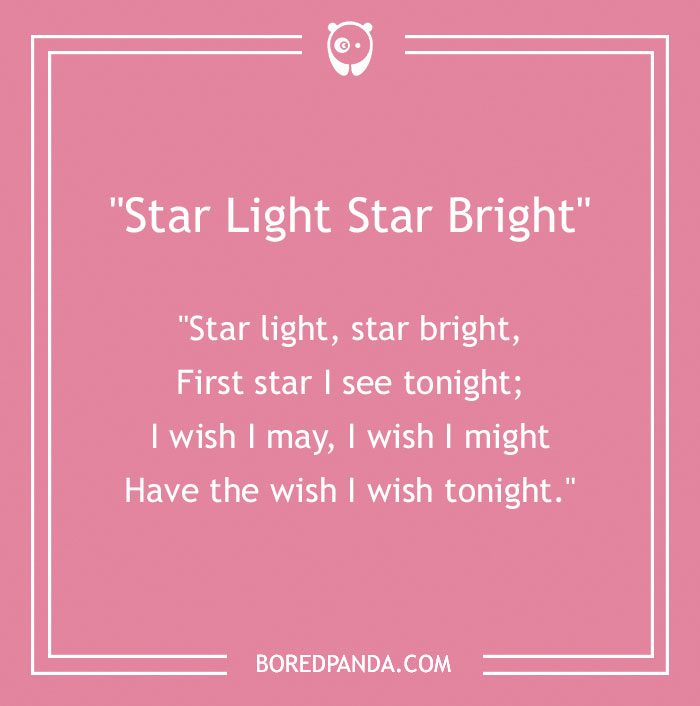 "Star Light Star Bright"
The rhyme which alludes to the idea that you can wish upon a star, is said to have its roots in late 19th-century America.
"Star light, star bright,
First star I see tonight;
I wish I may, I wish I might
Have the wish I wish tonight."
"Star Light Star Bright"
The rhyme which alludes to the idea that you can wish upon a star, is said to have its roots in late 19th-century America.
"Star light, star bright,
First star I see tonight;
I wish I may, I wish I might
Have the wish I wish tonight."
"The Grand old Duke of York" The Battle of Wakefield, which took place on December 30, 1460, and Richard, Duke of York, the pretender to the throne of England and Protector of England are said to be referenced in the nursery rhyme. Richard set up a defensive posture against the Lancastrian army while the Duke of York and his army marched to the castle he owned at Sandal. "Oh, the grand old Duke of York, He had ten thousand men; He marched them up to the top of the hill, And he marched them down again."
When I was a little kid growing up in the 50s, it was the King of France who marched up the hill
"Lavender’s Blue" Mr. Robert B. Waltz claims "The singer tells his girlfriend that since he loves her, she must also love him. He describes a valley where a young guy and a maid had camped together and advises them to follow suit". This broadside version, according to Sandra Stahl Dolby, is about a girl named Nell who keeps the singer's bed warm. "Lavender's blue, dilly dilly, lavender's green, When I am king, dilly dilly, you shall be queen: Who told you so, dilly dilly, who told you so? 'Twas mine own heart, dilly dilly, that told me so."
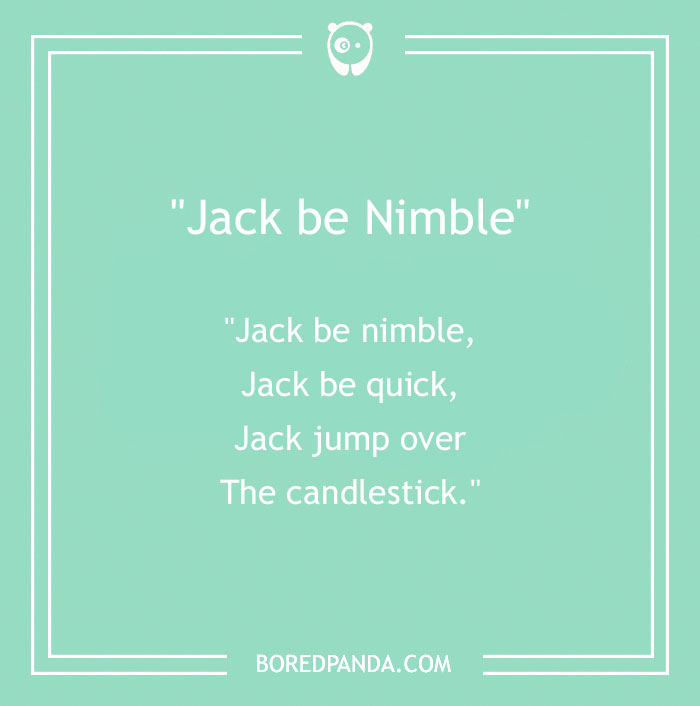 "Jack be Nimble"
The rhyme was initially discovered in a manuscript from approximately 1815, and James Orchard Halliwell began collecting it in the middle of the nineteenth century.
Jumping candlesticks was both a sort of sport and fate reading. It was believed that clearing a candle without putting out the flame would bring good fortune.
"Jack be nimble,
Jack be quick,
Jack jump over
The candlestick."
"Jack be Nimble"
The rhyme was initially discovered in a manuscript from approximately 1815, and James Orchard Halliwell began collecting it in the middle of the nineteenth century.
Jumping candlesticks was both a sort of sport and fate reading. It was believed that clearing a candle without putting out the flame would bring good fortune.
"Jack be nimble,
Jack be quick,
Jack jump over
The candlestick."
"How Many Miles to Babylon?" Although the poem was not written down until the nineteenth century, some have speculated that Caledon during the Crusades is what is meant by the allusion to Cantelon in the Scottish version. While the city was a frequent reference, notably in seventeenth-century England, and "Can I reach there by candlelight?" was a familiar phrase in the sixteenth century, Babylon may be a corruption of "Babyland." It refers to the time of day when a candle needed to be lit as the daylight dwindled. "How many miles to Babylon? Three score miles and ten. Can I get there by candle-light? Yes, and back again ... If your heels are nimble and your toes are light, You may get there by candle-light"
 "See Saw Margery Daw"
The rhyme may have its roots in a sawyer's labor song that helped maintain rhythm while using a two-person saw.
"See Saw Margery Daw,
Jacky shall have a new master;
Jacky shall earn but a penny a day,
Because he can't work any faster."
"See Saw Margery Daw"
The rhyme may have its roots in a sawyer's labor song that helped maintain rhythm while using a two-person saw.
"See Saw Margery Daw,
Jacky shall have a new master;
Jacky shall earn but a penny a day,
Because he can't work any faster."
"There Was an Old Woman Who Lived Under a Hill" This children's song first appeared in The Academy of Complements in 1714 as a catch. "There was an old woman lived under the hill, And if she's not gone she lives there still. Baked apples she sold, and cranberry pies, And she's the old woman that never told lies."
"The Lion and the Unicorn" The words of The Lion and the Unicorn were written in 1603 when James VI of Scotland united the Scottish and English kingdoms as James I of England. James, the son of Mary Queen of Scots, was designated as Elizabeth 1's successor. As a result of the two nations' union, a new royal coat of arms, known as "The lion and the unicorn" was created by merging Scotland's two unicorns with England's two lions. The British coat of arms now has one Lion and one Unicorn as a result of a compromise, and the poem "The Lion and the Unicorn" was written as a result. "The lion and the unicorn Were fighting for the crown The lion beat the unicorn All around the town."
"London Bridge is Falling Down" Although there are a number of potential sources for this incredibly well-known rhyme, it is most probable that the Vikings chanted it as they attacked the bridge in 1014. Variations of the song allegedly were sung by Vikings during a number of their victories. "London Bridge is falling down, Falling down, falling down. London Bridge is falling down, My fair lady."
Yeah, no. The earliest record of the bridge rhyme is from the 1600s and oral tradition to the 1400s. What your talking about is mistranslation issue. To quote Wikipedia on it: "One hypothesis of origin is that the rhyme relates to the supposed destruction of London Bridge by Olaf II in 1014 (or 1009).[10] The nineteenth-century translation of the Norse saga the Heimskringla, published by Samuel Laing in 1844, included a verse by Óttarr svarti, that looks very similar to the nursery rhyme: London Bridge is broken down. — Gold is won, and bright renown. Shields resounding, War-horns sounding, Hild is shouting in the din! Arrows singing, Mail-coats ringing — Odin makes our Olaf win! However, modern translations make it clear that Laing was using the nursery rhyme as a model for his very free translation, and the reference to London Bridge does not appear at the start of the verse and it is unlikely that this is an earlier version of the nursery rhyme.[1
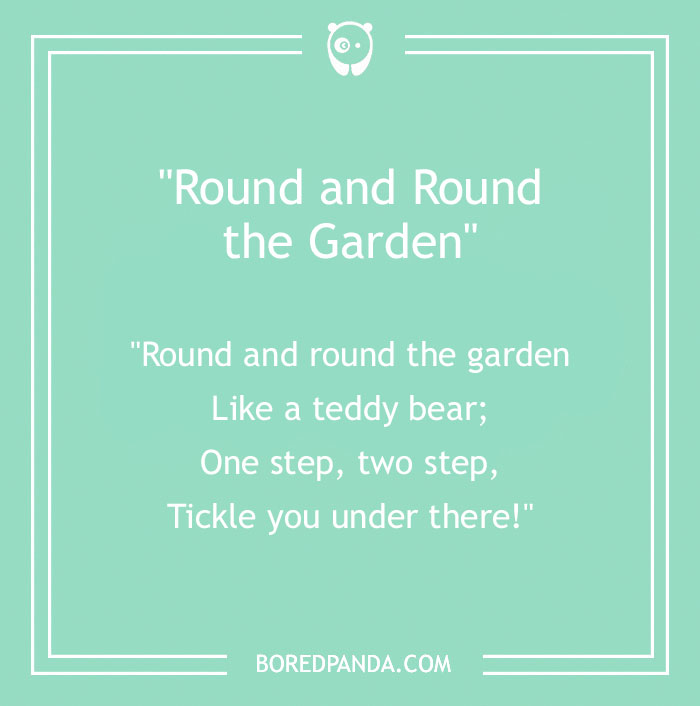 "Round and Round the Garden"
This nursery rhyme has very recent beginnings. One of the most popular presents to give a newborn infant is a "Teddy Bear," and this tradition dates back to the early 1900s, when the Ideal Novelty and Toy Co. in America and the Steiff company in Germany created the first plush Teddy Bears. Teddy, the nickname of former American President Theodore Roosevelt, is where the term Teddy Bear originated. Theodore Roosevelt, the president, went bear hunting in Mississippi in 1902. Members of the group surrounded a juvenile black bear, which Roosevelt found injured and ordered to be mercy killed.
"Round and round the garden
Like a teddy bear;
One step, two step,
Tickle you under there!"
"Round and Round the Garden"
This nursery rhyme has very recent beginnings. One of the most popular presents to give a newborn infant is a "Teddy Bear," and this tradition dates back to the early 1900s, when the Ideal Novelty and Toy Co. in America and the Steiff company in Germany created the first plush Teddy Bears. Teddy, the nickname of former American President Theodore Roosevelt, is where the term Teddy Bear originated. Theodore Roosevelt, the president, went bear hunting in Mississippi in 1902. Members of the group surrounded a juvenile black bear, which Roosevelt found injured and ordered to be mercy killed.
"Round and round the garden
Like a teddy bear;
One step, two step,
Tickle you under there!"
"Eeper Weeper" The narrative of a chimney sweep who murders his second wife and puts her body up a chimney is depicted in this well-known English nursery rhyme and skipping song. The rhyme has been used in this form at least since the first decade of the 20th century, according to Iona and Peter Opie. "Eeper Weeper, chimney sweeper, Had a wife but couldn't keep her. Had another, didn't love her, Up the chimney he did shove her."
 "To market, to Market"
The rhyme is first mentioned in John Florio's 1598 book "A Worlde of Wordes, or Most Copious, and exact Dictionarie in Italian and English," which defines "Abomba" as "a man's home or resting place: home againe, home againe," and the 1611 edition, which is even clearer, refers to "the place where children playing hide themselves... Also as we used to say Home againe home againe, market is done."
"To market, to market, to buy a penny bun,
Home again, home again, market is done."
"To market, to Market"
The rhyme is first mentioned in John Florio's 1598 book "A Worlde of Wordes, or Most Copious, and exact Dictionarie in Italian and English," which defines "Abomba" as "a man's home or resting place: home againe, home againe," and the 1611 edition, which is even clearer, refers to "the place where children playing hide themselves... Also as we used to say Home againe home againe, market is done."
"To market, to market, to buy a penny bun,
Home again, home again, market is done."
"Bobby Shafto's Gone to Sea" The song was used by the followers of Robert Shafto, a British Member of Parliament for County Durham in the eighteenth century, and afterwards the borough of Downton in Wiltshire. When he married Anne Duncombe of Duncombe Park in Yorkshire, the song is claimed to tell the tale of how he shattered Bridget Belasyse's heart at Brancepeth Castle in County Durham, where his brother Thomas served as rector. According to reports, Bridget Belasyse passed away two weeks after learning the news. "Bobby Shafto's gone to sea, Silver buckles at his knee; He'll come back and marry me, Bonny Bobby Shafto! Bobby Shafto's bright and fair, Combing down his yellow hair; He's my love for evermore, Bonny Bobby Shafto!"
"Humpty Dumpty" A small, clumsy individual who was frequently full of ail was referred to as Humpty Dumpty in the past. Additionally, because intoxicated people tend to stumble, they wouldn't have the ideal balance when engaging in drunken antics. "Humpty Dumpty sat on a wall, Humpty Dumpty had a great fall. All the king's horses and all the king's men Couldn't put Humpty together again."
My Medieval Lit professor said that this rhyme had 2 possible meanings: 1) that Humpty Dumpty was referring to King Richard the 3rd, who fell in battle, or 2) one of the first cannons used in a battle in England exploded and fell off the wall it was on and shattered into pieces, so it couldn't be repaired. Humpty Dumpty wasn't portrayed as an egg until Victorian times, in some children's book.
 "Pop Goes the Weasel"
Pop goes the Weasel for Fun and Frolic was released as sheet music by Miller & Beacham of Baltimore in the early 1850s. The first source that links the name to this song is this one. The music by Miller and Beacham was an adaptation of the 1700s song "The Haymakers." The "Haymakers" country dance or jig can be found in Gow's Repository of the Dance Music of Scotland (1799 to 1820).
"Half a pound of tuppenny rice,
Half a pound of treacle.
That's the way the money goes,
Pop! Goes the weasel."
"Pop Goes the Weasel"
Pop goes the Weasel for Fun and Frolic was released as sheet music by Miller & Beacham of Baltimore in the early 1850s. The first source that links the name to this song is this one. The music by Miller and Beacham was an adaptation of the 1700s song "The Haymakers." The "Haymakers" country dance or jig can be found in Gow's Repository of the Dance Music of Scotland (1799 to 1820).
"Half a pound of tuppenny rice,
Half a pound of treacle.
That's the way the money goes,
Pop! Goes the weasel."
I was told that this rhyme was about the horrible living and working conditions in Edwardian or Victorian London. "Pop! goes the weasel" is about the cobbler having to sell his shoemaking tools (aka a "weasel") in order to buy food to feed his family (tupenny rice and treacle), even though it would cost him his livelihood. The other verses about the preacher chasing and kissing the cobbler's wife is about his wife having to prostitute herself to earn money for food afterwards.
"There was a Little Guinea Pig" Like many classic nursery rhymes, the roots and lyrics of "There was a tiny guinea-pig" have buried, hidden meanings and make references to historical figures and events. The characters at King Richard III of England's Plantagenet court are said to be the subject of references in the poem "There was a tiny guinea-pig." Sir Thomas Catesby was the Cat. Sir William Ratcliffe of Ordsall Hall was the Rat. Francis, Lord Lovell was a dog, a now-extinct hunting hound breed, talbot. Richard III was "The Hog" (his emblem was a white boar). "There was a little Guinea-pig, Who, being little, was not big; He always walked upon his feet, And never fasted when he eat."
Guinea pigs come from South America, so I doubt they were even known of in medieval Europe. 🤔
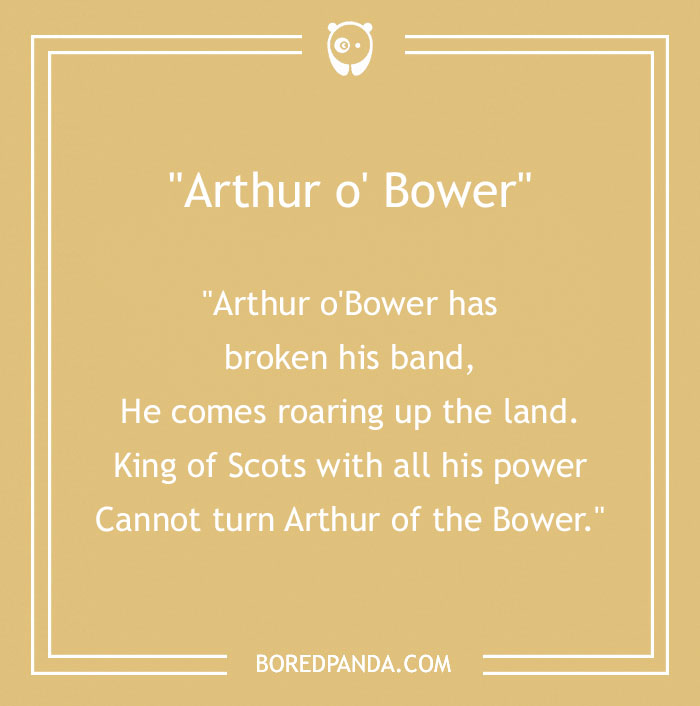 "Arthur o' Bower"
In 1823, William Wordsworth recalled hearing this rhyme "in the time of a strong wind" as a young boy. According to an anonymous contributor to The Spectator in 1893, in the 1830s, "We yelled or sung as we ran whenever we were joyful enough to be running around in a strong wind as kids. In fact, it was frequently performed while dangling from the top of a tree since it was thought to be an essential accompaniment to the wind."
"Arthur o'Bower has broken his band,
He comes roaring up the land.
King of Scots with all his power
Cannot turn Arthur of the Bower."
"Arthur o' Bower"
In 1823, William Wordsworth recalled hearing this rhyme "in the time of a strong wind" as a young boy. According to an anonymous contributor to The Spectator in 1893, in the 1830s, "We yelled or sung as we ran whenever we were joyful enough to be running around in a strong wind as kids. In fact, it was frequently performed while dangling from the top of a tree since it was thought to be an essential accompaniment to the wind."
"Arthur o'Bower has broken his band,
He comes roaring up the land.
King of Scots with all his power
Cannot turn Arthur of the Bower."
"As I was going by Charing Cross" The equestrian statue of Charles I that was built during the Restoration in 1660 and transported to the location of the former Charing Cross in central London in 1675 is supposed to be the subject of the poem. Although the tarnished bronze statue's color is mostly dark, the word "black" might be a reference to the king's hair color. "As I was going by Charing Cross, I saw a black man upon a black horse; They told me it was King Charles the First- Oh dear, my heart was ready to burst!"
We always said this as "As I was going to Banbury Cross/ I seen a fine lady upon a white horse./ With rings on her finggers and bells on her toes/ She shall ha e music wherever she goes. " Maybe here in the US we have a different version?
 "Baby Shark"
It began as a chant or song over a campfire. The original song was likely written in the 20th century and may have been inspired by the Jaws film by camp counselors. The campers use their hands to mimic the sharks' jaws as they introduce each member of a family of sharks in the chant.
"Baby Shark, doo-doo, doo-doo
Baby Shark, doo-doo, doo-doo
Baby Shark, doo-doo, doo-doo
Baby Shark."
"Baby Shark"
It began as a chant or song over a campfire. The original song was likely written in the 20th century and may have been inspired by the Jaws film by camp counselors. The campers use their hands to mimic the sharks' jaws as they introduce each member of a family of sharks in the chant.
"Baby Shark, doo-doo, doo-doo
Baby Shark, doo-doo, doo-doo
Baby Shark, doo-doo, doo-doo
Baby Shark."
I thought it began as an obnoxious children's song meant to annoy adults...
"Did You Ever See a Lassie?" Although this song was first collected in the United States in the latter decade of the nineteenth century and was not discovered in Great Britain until the middle of the twentieth, the usage of the names "lassie" and "laddie" indicate that it may have Scottish origins. However, it might be suggested that Scottish immigrants or Scottish-Americans may have contributed to the song's lyrics. "Did you ever see a lassie, A lassie, a lassie? Did you ever see a lassie, Go this way and that? Go this way and that way, Go this way and that way. Did you ever see a lassie, Go this way and that?"
How come nobody mentioned Ring Around the Rosie? It was about the Black Plague.
Seriously what I was waiting for the entire read. I actually thought that it would've been the top post but it didn't even make the list?
Load More Replies...Most of these are folk etymologies made up to explain something people don't know about. Just-so stories
How come nobody mentioned Ring Around the Rosie? It was about the Black Plague.
Seriously what I was waiting for the entire read. I actually thought that it would've been the top post but it didn't even make the list?
Load More Replies...Most of these are folk etymologies made up to explain something people don't know about. Just-so stories

 Dark Mode
Dark Mode 

 No fees, cancel anytime
No fees, cancel anytime 






